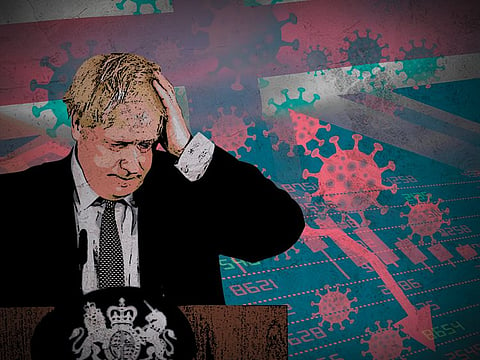Johnson faces double whammy on new coronavirus variant
Epidemiologists expect the vaccine to work on the new strain but more work is needed

Things couldn’t feel less festive in Britain right now. There’s a new — apparently home-grown — virus mutation, rising Covid case numbers, the cancellation of Christmas gatherings, and stalled Brexit talks. Now Europe has put the UK into isolation, closing borders because of worries about the new Covid strain.
It isn’t just Christmas travellers who face disruption. Some 10,000 large trucks a day make the trip between France’s Calais and Dover, the U.K.’s biggest port for roll-on, roll-off ferries. The latter accounts for 17% of British goods trade; 119 billion pounds ($158 billion) of goods passed through the port in 2015. There’s a risk of highways to Dover becoming car parks if the border remains shut.
France says it will try to put measures in place to get freight moving again, given that viruses aren’t usually transmitted by truck. But the disruption provides an early taste of what awaits if Britain leaves the European Union without a trade deal on Dec. 31.
Trade-deal compromise
For many Brexiters that’s a feature not a bug. “This mutant virus has come at a time which allows us to sort of hide our lack of preparation and leave without a deal,” Ben Habib, a former Brexit Party member of the European Parliament told Talk Radio. Such views are shared by some in the ruling Conservative Party, making it harder for Johnson to strike a trade-deal compromise.
The situation on Britain’s borders is clearly serious, but will it wound Johnson fatally? That all depends on how many Britons are inclined to blame the virus for the chaos — especially if the EU-U. K. trade talks collapse — and how many will point a finger at their prime minister.
While Johnson didn’t cause the virus, he seems unable to project a sense of being in control of the response. It’s never clear whether scientists, pollsters or his own backbenchers are guiding policy.
The plan, announced in November, to allow up to three households to mix over Christmas was always a non-starter. Case numbers weren’t falling as rapidly as the government hoped in parts of the country and Thanksgiving holiday evidence from Canada and the US suggested a free-for-all would be disastrous.
A Christmas cancelled
Johnson might have told the public he would make a better assessment closer to the holidays. But as evidence mounted that the virus was out of control again in some places and that England couldn’t afford a Christmas relaxation, he initially doubled down.
A number of his members of Parliament pushed back against lockdown restrictions. Johnson heeded that warning. In Parliament last week, he said it would be “inhuman” to change his plans. By Saturday, things had changed.
London and swaths of the country have now been placed in a new “Tier 4” of restrictions: Shops, restaurants, pubs, gyms and leisure centers are closed. Tier-4 households can’t mix at all during the holidays. That prompted a weekend stampede as people headed to motorways and train stations to join family before the deadline.
The prime minister’s hand was forced by information on a virulent new form of Covid, but the data have been pointing this way for weeks now, and his government’s somewhat panicked messaging about the new “mutation” at the weekend hardly calmed the public or other nations. One EU country after another has closed its borders to UK travellers.
While RNA viruses such as SARS-CoV-2 are expected to mutate (and many mutations of this coronavirus have already been logged), this variant needs to be taken seriously. By linking genetic data to the epidemiological data, scientists were able to correlate the new variant and rising case numbers in parts of the country.
70% more transmissible
The government says it may be up to 70% more transmissible than the existing strain. Epidemiologists estimate the new variant raises the R number — which measures transmissibility — by 0.4. This makes it likely that current lockdowns may last longer, as Health Secretary Matt Hancock acknowledged Sunday, while we wait for the vaccines to take effect.
Most epidemiologists expect the vaccine will still work on the new strain. But there’s more work needed to understand how antibodies are altered. Johnson’s eventual decision to cancel Christmas was undoubtedly right.
But in a vacuum of faith, conspiracy theories and populist agendas flourish. Some say the government has hyped the mutation to excuse its Christmas policy error or that the EU is punishing Britain with border closures because of acrimonious Brexit talks.
Things may look different by mid-2021. A successful vaccination program, further extensions of UK government subsidies, better weather and a Brexit trade deal would let Johnson refocus on his “rebalancing” agenda to improve the lot of working-class communities. It would restore optimism and begin to revive an economy that has suffered Europe’s worst recession.
Therese Raphael is a noted political columnist. She was editorial page editor of the Wall Street Journal Europe.
Bloomberg






